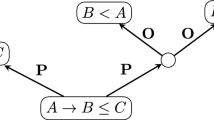Abstract
In this paper, we propose a game semantics for the (associative) Lambek calculus. Compared to the implicational fragment of intuitionistic propositional calculus, the semantics deals with two features of the logic: absence of structural rules, as well as directionality of implication. We investigate the impact of these variations of the logic on its game semantics.
Similar content being viewed by others
References
Blass, Andreas, ‘Is game semantics necessary?’ in Egon Börger, Yuri Gurevitch, and Karl Meinke (eds.), 7th workshop on Computer Science Logic (CSL’03), volume LNCS 832, Springer Verlag, 1993, pp. 66–77.
Hindley, J. Roger, Basic simple Type Theory, Cambridge University Press, 1997.
Lambek Joachim: ‘The mathematics of sentence structure’. Amer. Math. monthly 65, 154–170 (1958)
Moortgat, Michael, ‘Categorial type logics’, in Johan van Benthem and Alice ter Meulen (eds.), Handbook of Logic and Language, North Holland, 1997, pp. 93–178.
Sorensen, Morten Heine, and Pawel Urzyczyn, Lectures on the Curry-Howard Isomorphism, Elsevier Science, 2006. Studies in Logic and the foundations of Mathematics.
Wansing, Heinrich, The Logic of Information Structures, Springer Verlag, LNAI 681, 1993.
Author information
Authors and Affiliations
Corresponding author
Rights and permissions
About this article
Cite this article
Shoham, S., Francez, N. Game Semantics for the Lambek-Calculus: Capturing Directionality and the Absence of Structural Rules. Stud Logica 90, 161–188 (2008). https://doi.org/10.1007/s11225-008-9148-z
Received:
Published:
Issue Date:
DOI: https://doi.org/10.1007/s11225-008-9148-z




